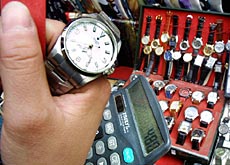
Counterfeiting takes the shine off jewellery

Organisers of Basel’s watch and jewellery show are hammering home the message that the counterfeiting of luxury goods is bad for business, with millions of dollars at stake.
The exhibition has its own independent arbitration body to combat infringement of intellectual property – the “Baselworld” Panel – which is marking its 20th anniversary.
The Panel was formed as a kind of “in-house” court after exhibitors at Basel were increasingly confronted with copies of their designs, infringements of their brands and unfair competition.
“Imitations and forgeries have become a global social phenomenon. In our day and age, virtually everything is pirated,” commented Jacques Duchêne, president of the exhibitors’ committee in Basel.
He said the scope of the problem was often underestimated by both consumers and authorities.
Entertainment value
“They feel that such activities are an issue of little significance and negligible consequence. After all, imitations do have a certain entertainment value,” he added.
The panel says counterfeiters are no longer small-time crooks working out of garages, but have become industrial-scale operations with significant cash flow and resources.
And it is trying to hammer home the point that by buying counterfeit products, consumers are actively participating in theft and are to some extent also implicated in financing organised crime.
The world market for counterfeit brand watches alone is estimated at more than €7 billion (SFr10.85 billion).
The panel says that the global watch industry spends tens of millions of dollars fighting counterfeiting, money which could be better spent on research, promotion or production.
Anti-counterfeiting expenditure essentially slows down a company’s development, it argues.
Raw deal
The panel claims that consumers who buy counterfeit watches are getting a raw deal because the prices paid are “hugely excessive” compared with the actual value of the product.
It argues that counterfeiting has economic and social costs, too, not least because producers of such goods do not usually pay taxes and social security contributions.
They also exploit workers, often employing minors, and they deprive people of jobs in watch-manufacturing countries.
The panel also makes the point that exploitation of a product through copying of brands and designs has a negative effect on consumers’ attitudes towards the original product.
swissinfo, Robert Brookes in Basel
Members of the Basel Panel include two specialists from the watch industry, a jewellery expert, and two to three Swiss legal experts with a background in intellectual property rights.
The Panel has dealt with more than 600 cases since it was established in 1984.
Decisions by the Panel are considered effective in ensuring professional conduct on the part of exhibitors and are influential to a certain degree in judicial hearings.

In compliance with the JTI standards
More: SWI swissinfo.ch certified by the Journalism Trust Initiative




























You can find an overview of ongoing debates with our journalists here . Please join us!
If you want to start a conversation about a topic raised in this article or want to report factual errors, email us at english@swissinfo.ch.